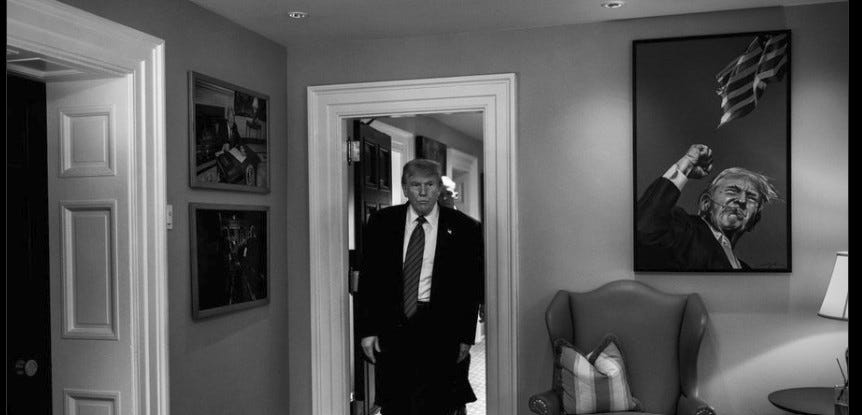
With House and Senate Republicans still struggling to find consensus on a budget reconciliation bill extending and expanding the expiring tax cut package from Donald Trump’s first term, Representative Jason Smith made a surprising statement during a Fox News Sunday interview on May 4.
Asked if “upper earners may face higher taxes,” the chair of the tax-writing House Ways and Means Committee replied: “There’s no problem to eliminate loopholes that the wealthy have benefited from to make sure that working-class Americans aren’t paying taxes on tips, seniors are having reduced taxes on their Social Security, and we’re not paying taxes on overtime.”
Smith isn’t the only Republican suggesting revenue raisers that impact the wealthy. According to yesterday’s Punchbowl News, “senior Trump administration officials” are still “interested in” a “variety of tax provisions, including rate increases for wealthy Americans.” Rate hikes on the wealthy are still on the table despite Trump telling Time last month that “the only reason I wouldn’t support it is because I saw [George H.W.] Bush where they said, where he said ‘Read my lips’ and he lost an election.”
Whether Republicans will do what had been unthinkable and support higher taxes on the wealthy, be it from broad rate hikes or narrow tax code changes, is far from certain. Punchbowl News noted that House Speaker Mike Johnson continues to oppose tax increases. As I wrote last week, tax cuts have long been central to the GOP identity, and the populist push for tax increases—apparently supported by Vice President J.D. Vance and others in the White House—has already begun to threaten party unity.
Smith’s framing is common-sensical and populist, transparently designed to rob Democrats of the ability to skewer Republicans for yet another tax bill benefiting millionaires and billionaires. Smith is taking a cue from Steve Bannon, the former Trump adviser who maintains an outsized platform with his War Room podcast. Bannon told the The Washington Post about taxing the wealthy, “Politically, it’s game, set, match—it’s a no-brainer. This would destroy the Democrats.”
Like most of what escapes Bannon’s mouth, that’s hyperbole. But a tax bill that, on net, increased taxes on the wealthy and decreased taxes on everyone else would more closely resemble a Democratic bill than a Republican one. And that would leave Democrats without their usual rejoinders.
However, the keywords are “on net.” Exactly how much more or less the wealthy and the working class would pay depends on the details.
Eliminating taxes on tips, Social Security, and overtime sounds like a policy that would largely help working-class households. But it does so the most for upper-middle-class households. The Institute for Taxation and Economic Policy (ITEP) explains that “lower- and moderate-income families are generally not positioned to make full use of these tax exemptions due to other exemptions and the income tax’s graduated rate structure.”
The top one percent does not get much tips and overtime, but they get Social Security. Penn Wharton Budget Model found that for 2026, eliminating income taxes on Social Security benefits would give the bottom 20 percent nothing and the next-lowest quintile an average break of $15, while most of the top one percent would get $2205, with the top 0.1 percent getting $2450.
The biggest beneficiaries of eliminating taxes on tips and overtime are not the top one percent but the top 20 percent (starting at about $157,000 in annual income). For overtime, according to ITEP, the bottom 20 percent would get back about $10 in 2026, while the top 20 percent would get an average of $1480. For tips, according to the Tax Policy Center, the bottom 20 percent could expect $730, and the top 20 percent $7,170.
These estimates assume Trump’s tax proposals would apply to all taxpayers, regardless of income bracket. Republicans could cap the benefits to lower-income and middle-income families, though that could make the proposals an even tougher sell to anti-tax Republicans.
And when calculating net tax benefits, we can’t forget Trump’s regressive tariffs. Regardless of how the tax bill details impact the wealthiest, any benefits to working-class families may still be negated by the taxes they will soon be paying when shopping.
We don’t know specifics yet because Republicans are nowhere near reaching consensus on their budget reconciliation bill, and the chances of a total collapse are non-zero.
Smith sounded more than a little desperate on Fox News Sunday when he said twice, “Failure is not an option” because otherwise, “every single American will face, on average, a 22 percent tax increase.” That is likely a tacit acknowledgment of what would happen if Trump’s first-term, officially temporary tax cuts expire, without even considering the higher consumer costs from the tariffs. Also on Sunday, Trump told NBC’s Meet the Press, “If it doesn’t get approved, it’s a 68 percent tax increase, and that’s what the Democrats want.”
Trump and Smith may be correct that the prospect of owning a giant tax increase will pressure Republicans to find a compromise, however politically awkward. That Trump and Smith are resorting to such pressure at this stage of the process, on top of once sacrilegious tax increases being considered, betrays the tenuous state of intra-party negotiations—which involving trying to balance demands for severe spending cuts and extreme deficit reduction from rabid fiscal hawks with the political needs of vulnerable swing district congresspeople. However, even if some tax increases make it into a final bill, we’ll have to read the fine print to see if the wealthy really are being forced to bear a larger burden of our tax responsibilities.
The post This Republican Just Cracked the Doors Open to Higher Taxes on the Wealthy (Or Did He?) appeared first on Washington Monthly.


 1 month ago
9
1 month ago
9 










 Bengali (Bangladesh) ·
Bengali (Bangladesh) ·  English (United States) ·
English (United States) ·